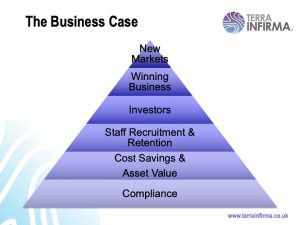What is a stranded asset?
In last week’s episode of The Net Zero Business Podcast, Dr Olli Jones talked about ‘stranded assets’ and ‘stranding assessments’, so I thought I should dive a little deeper into the concept. Put simply, a stranded asset is an asset whose value has collapsed due to its carbon footprint.
This might sound a bit esoteric, so let’s reminisce a bit. When I was a teenager, if I was out and about and my plans changed, I would seek out a public telephone box, slip 10p into the slot and ring my parents so they wouldn’t worry. The number of phone boxes in the UK peaked at 100,000, in 2021 that number had fallen to 21,000. With 96% of British adults now owning a mobile phone, they have simply become redundant – in fact BT has been selling off the iconic red telephone boxes for as little as £1. My teenagers text me to tell me their whereabouts – most of the time – and no longer have to hunt down a pay phone. Who would invest in pay phones now?
I first came across the concept of stranded assets 15 years ago when I was interviewing Sustainability leaders for my second book, The Green Executive. Martin Blake, then of the Royal Mail told me “we also want to avoid depreciation of the book value of our built estate. So when we get to 2019 [!] and everybody is looking for low carbon buildings… what will be the effect on the yield values, rental values and capital values of our estate, which is worth billions?”
 At that point I added ‘asset values’ to the ‘cost savings’ level of my business case for sustainability model, but I have to say it is the most neglected item on there – it rarely comes up in conversation with my clients, even with my prompting. This worries me – as I often ask – whose carbon footprint are you part of?
At that point I added ‘asset values’ to the ‘cost savings’ level of my business case for sustainability model, but I have to say it is the most neglected item on there – it rarely comes up in conversation with my clients, even with my prompting. This worries me – as I often ask – whose carbon footprint are you part of?
It is also where we are quite likely to get push back on Net Zero policies as those with a hefty investment in high carbon assets start to see that investment erode. We’ve already seen a glimpse of this in the UK Government’s somewhat overwrought attacks on working from home (who can forget “woke-ing from home”), said to be driven by big business complaining people aren’t buying newspapers on their way to work and that many big renters of office space are starting to downsize to reflect a hot-desking, flexi-working workforce. Increasingly these tenants are going to be looking for low carbon offices/facilities to meet their own Net Zero targets.
If you listen to Olli’s interview, he says some built environment assets were stranded in carbon terms in 2014 or 2016, so Martin Blake’s estimation of 2019 for a crunch isn’t wide of the mark. But it is clear that asset intensive businesses must start investing in decarbonising those assets or they will end up stranded like a beached whale.

